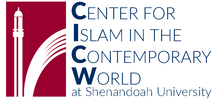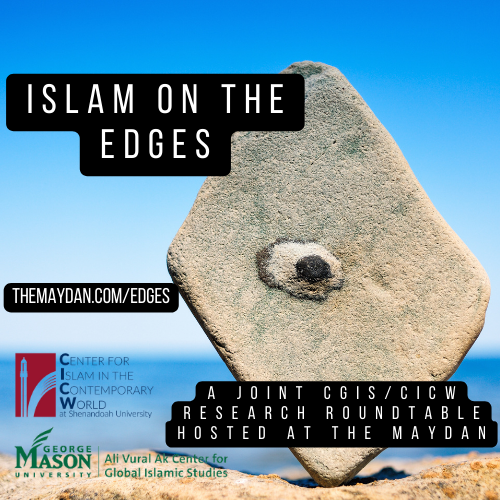Call for Contributions- Thematic Focus on “Islam on the Edges” in Collaboration with GMU's Global Islamic Center
The Maydan calls for contributions from academics, researchers, artists and others around the theme “Islam on the Edges.”
Developed as a research agenda by Ermin Sinanović, Executive Director at the Center for Islam in the Contemporary World at Shenandoah University, “Islam on the Edges” is an intentional effort to shift focus away from assumed centers of the Islamic world to better understand the global nature of Islam. The AbuSulayman Center for Global Islamic Studies at George Mason University and CICW are initiating a new collaborative project with this call for contributions that will showcase the thematic diversity of “Islam on the Edges” via the AVACGIS open access digital scholarship platform, Maydan. Accepted submissions published on the Maydan will receive an honorarium of $200. Please see below for information regarding the submission process. This collaboration will also involve a diverse set of scholarly gatherings and output over the next year.
Developed as a research agenda by Ermin Sinanović, Executive Director at the Center for Islam in the Contemporary World at Shenandoah University, “Islam on the Edges” is an intentional effort to shift focus away from assumed centers of the Islamic world to better understand the global nature of Islam. The AbuSulayman Center for Global Islamic Studies at George Mason University and CICW are initiating a new collaborative project with this call for contributions that will showcase the thematic diversity of “Islam on the Edges” via the AVACGIS open access digital scholarship platform, Maydan. Accepted submissions published on the Maydan will receive an honorarium of $200. Please see below for information regarding the submission process. This collaboration will also involve a diverse set of scholarly gatherings and output over the next year.
Why Islam on the Edges?
While there has been significant development towards more pluralistic approaches to the study of Islam that emphasize its global and non-monocentric nature, there are still significant remnants of the old approaches that emphasize the centrality of the Middle Eastern and Near Eastern histories, languages, and cultures. Such approaches may be understandable, but their persistence in today’s globalized present should be interrogated. “Islam on the Edges” is both poly-centric and non-centric: it invites us to think of multiple vital centers of Muslim culture and religious experience that are equally important and constitutive of what makes Islam a global presence. In its poly-centric nature, Islam on the Edges imparts a non-centric understanding of the Muslim religion. No center or region is more critical to the understanding of global Islam than another. However, the geographically-oriented manifestations are not the only concern for the methodological insights derived from “Islam on the Edges.” This research program can also be understood as history, theology, memory, or culture, among other things.
The Focus on Non-Conventional Lines of Inquiry
As an example, to understand Muslim experience in history it is just as important to study boarding schools in Java, Islamic revival in the Malay hinterland, Muslim contributions to South Africa’s anti-Apartheid struggle, trans-oceanic Muslim cultures in the Caribbean, scholastic traditions in Western Africa, Islam under Eastern European and Central Asian communism, secularization and Europeanization of Islam in Western Europe, or the emergence of neo-traditionalism in North America–as it is to understand the “golden age” of the Abbasid caliphate or the administrative and martial genius of the Ottomans.
A Corrective and a Cautionary Lens
In its geographically oriented manifestations, Islam on the Edges calls us to reimagine the map of global Islam in line with the actual lived experiences of Muslims around the globe. We recognize that in some regards such a focus may actually serve to perpetuate the assumed presence of a center and a periphery. The Islam on the Edges research agenda is therefore both a corrective but also a cautionary lens; one that seeks to undo our myopia as it simultaneously reminds us of the poly-centric nature of global Islam in eschewing essentializing orthodoxies and normoativities at the expense of nuance and complexity.
Maydan’s call for contributions to “Islam on the Edges” places an emphasis on multi-disciplinary, both academic and ‘from the ground’ perspectives on:
While there has been significant development towards more pluralistic approaches to the study of Islam that emphasize its global and non-monocentric nature, there are still significant remnants of the old approaches that emphasize the centrality of the Middle Eastern and Near Eastern histories, languages, and cultures. Such approaches may be understandable, but their persistence in today’s globalized present should be interrogated. “Islam on the Edges” is both poly-centric and non-centric: it invites us to think of multiple vital centers of Muslim culture and religious experience that are equally important and constitutive of what makes Islam a global presence. In its poly-centric nature, Islam on the Edges imparts a non-centric understanding of the Muslim religion. No center or region is more critical to the understanding of global Islam than another. However, the geographically-oriented manifestations are not the only concern for the methodological insights derived from “Islam on the Edges.” This research program can also be understood as history, theology, memory, or culture, among other things.
The Focus on Non-Conventional Lines of Inquiry
As an example, to understand Muslim experience in history it is just as important to study boarding schools in Java, Islamic revival in the Malay hinterland, Muslim contributions to South Africa’s anti-Apartheid struggle, trans-oceanic Muslim cultures in the Caribbean, scholastic traditions in Western Africa, Islam under Eastern European and Central Asian communism, secularization and Europeanization of Islam in Western Europe, or the emergence of neo-traditionalism in North America–as it is to understand the “golden age” of the Abbasid caliphate or the administrative and martial genius of the Ottomans.
A Corrective and a Cautionary Lens
In its geographically oriented manifestations, Islam on the Edges calls us to reimagine the map of global Islam in line with the actual lived experiences of Muslims around the globe. We recognize that in some regards such a focus may actually serve to perpetuate the assumed presence of a center and a periphery. The Islam on the Edges research agenda is therefore both a corrective but also a cautionary lens; one that seeks to undo our myopia as it simultaneously reminds us of the poly-centric nature of global Islam in eschewing essentializing orthodoxies and normoativities at the expense of nuance and complexity.
Maydan’s call for contributions to “Islam on the Edges” places an emphasis on multi-disciplinary, both academic and ‘from the ground’ perspectives on:
- Lived experiences of Islam as experienced by multiple audiences along the Edges that serve as a corrective to other essentializing discourses.
- An explicit attention on literature, architecture, music, and other forms of cultural and material production
- Social innovation and entrepreneurship emanating from Muslim experience on the Edges
- A focus on diverse theological, jurisprudential, and linguistic experiences along the Edges from within Muslim societies and their relationship with other faiths, traditions, and experiences.
Submission Process
General submission guidelines are detailed here: https://themaydan.com/submissions. Please note the following:
General submission guidelines are detailed here: https://themaydan.com/submissions. Please note the following:
- Maydan accepts essays that range in length, typically between 1500-2500 words.
- Curated submissions (a series of essays and/or a combination of essays and video content) are also welcome.
- Contributors are encouraged to utilize hyperlinks and include visual material that help readers engage with their content.
To learn more information about Islam on the Edges, please click below.
Contributions
In this first contribution to the Islam on the Edges portfolio on @themaydan, journalist Mehreen Sheikh @mehr1876 looks at the recent critical report on the Schøyen Collection and it's problematic collection and preservation practices.
Click HERE to read the article.
Click HERE to read the article.

